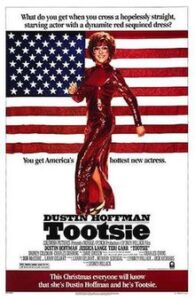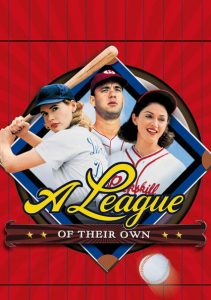Tootsie-1982
Director Sydney Pollack
Starring Dustin Hoffman, Jessica Lange, Teri Garr
Scott’s Review #1,449
Reviewed November 2, 2024
Grade: A
Dustin Hoffman is perfectly cast in the romantic comedy Tootsie (1982), a blockbuster hit from 1982 with much going on within its cinematic walls and a progressive-leaning slant.
Sydney Pollack directs and also has a supporting role in the film.
In addition to Hoffman, Jessica Lange, Teri Garr, Dabney Coleman, and Charles Durning give all-star performances.
Tootsie is genuinely funny and a treat for anyone who has ever auditioned or been interested in the acting or theater professions. The popular soap opera or daytime drama genre features directors, producers, and actors intertwining.
Romance, drag, wacky setups, insecurities, and social commentary on gender inequality are analyzed making Tootsie more relevant than most romantic comedies and an unforgettable experience.
Hoffman plays New York actor Michael Dorsey (Dustin Hoffman), a talented yet opinionated perfectionist unable to find work. His flustered agent (Pollack) sends him on a soap opera audition that goes poorly.
Michael decides to reinvent himself as actress Dorothy Michaels and wins the part. What was supposed to be a short-lived role turns into a long-term contract, but when Michael falls for his castmate Julie (Jessica Lange), complications develop.
Hoffman flawlessly merges with Dorothy, a feminist, to make her a character the audience loves and champions. This is a risky assignment and could easily make the character a goof or not be taken seriously.
Not only does Hoffman look convincing in a dress, wig, heels, and a feminine southern accent, but he makes us forget he’s a man.
The hilarity of other characters not knowing Dorothy is Michael is there when a romantic quadrangle develops. Neurotic Sandy Lester (Garr) is in love with Michael while he is in love with Julie who thinks Michael is Dorothy. Finally, Julie’s father, Les (Durning) falls for Dorothy.
The New York setting works wonderfully as struggling actors, greedy agents, and temperamental directors co-exist on tense sets, over dinners, and at many schmoozy parties. This presents the grit of New York show business in the 1980s when the city was crime-infested and dangerous.
The hustle and bustle perfectly showcases the time.
Pollack and screenwriters, Larry Gelbart and Murray Schisgal, add satire to the soap opera, or as mentioned in the film, the politically correct, daytime drama, world.
The horny and inept longtime cast member, John Van Horn (George Gaynes) needs a teleprompter while the sexy ingenue April (Geena Davis) prances around in underwear. Hurried script rewrites and pages of dialogue to memorize makes the cast frazzled and rushed.
Tootsie takes an important though lighthearted approach to sexism but at least it’s recognized. Dorothy scolds her boss and director Ron (Coleman) for calling her demeaning nicknames like ‘Tootsie’ and treating Julie, who he’s casually dating, poorly.
Michael begins to realize that he doesn’t treat Sandy well either so he learns from his experience as a woman and being judged on beauty rather than anything else.
It forces the audience to realize this too. Tootsie was released in the early 1980s when women’s liberation was strong and more women were in the workplace so the message was timely.
The producer of the fictional soap opera is female which enhances the gender message brought across.
Still, the comedy takes center stage and the film isn’t a message movie. The funny moments feel fresh as the characters work their magic. Julie first assumes Dorothy is a lesbian when they nearly kiss and Sandy thinks Michael is having an affair with Dorothy which means he is having an affair with himself.
The antics go on and on and resemble the classic Some Like It Hot (1959) especially tender moments between Les and Dorothy.
Tootsie (1982) holds up well decades after release. Smart dialogue, witty sequences, and strong characters make it a timeless treasure to revisit often.
Oscar Nominations: 1 win-Best Picture, Best Director-Sydney Pollack, Best Actor-Dustin Hoffman, Best Supporting Actress-Jessica Lange (won), Teri Garr, Best Screenplay-Written Directly for the Screen, Best Cinematography, Best Film Editing, Best Original Song-“It Might Be You”, Best Sound


